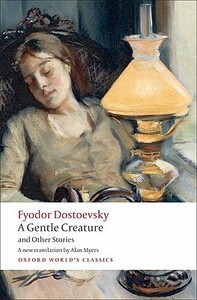Take a photo of a barcode or cover
challenging
reflective
medium-paced
Plot or Character Driven:
Character
Strong character development:
Complicated
Loveable characters:
No
Diverse cast of characters:
No
Flaws of characters a main focus:
Yes
challenging
mysterious
reflective
sad
slow-paced
Plot or Character Driven:
Character
reflective
medium-paced
Plot or Character Driven:
Character
Strong character development:
Yes
Loveable characters:
Complicated
Diverse cast of characters:
No
Flaws of characters a main focus:
Yes
Moderate: Suicide
This is a review of the Oxford World’s Classics edition.
No-one familiar with Dostoevsky’s work will be surprised by any of the characters or themes in the three stories collected here.
The first, White Nights, tells of the encounter between a lonely dreamer and a pretty young orphan girl who lives with her grandmother. They meet at night while the dreamer is walking through the streets of Petersburg and strike up a conversation in which he can pour out all the naive fantasies conjured up by his fertile imagination. They talk without any of the artifice or reserve seen in European romantic novels of the period. This is typical of Dostoevsky’s characters. Though his story is in part intended as a satirical commentary on the excesses of German Romanticism, it nevertheless reveals the purity, exuberance and idealism of Dostoevsky’s own version of it.
The story is both charming and sad, an indivualistic work of rare character.
The second story, A Gentle Creature, takes us inside the mind of a man who is coming to terms with a traumatic incident linked to his past behaviour. Dostoevsky reveals the entire plot of the story in an author’s note apologising for the way in which the story is told. He has presented, he says, the “psychological sequence” of the man’s thoughts as a stenographer would have recorded them, but has polished and refined the presentation of them to make them easier to read.
Modern readers are by now used to this style of narrative and Dostoevsky wasn’t the first to use it but perhaps the critics of his day would look for any excuse to attack his fiction.
Even now, though, I think many readers struggle to separate the identity of a narrator from the identity of the author, and the risk is no less present in the writings of Dostoevsky even when he is presenting, as here, a coarse and cowardly individual. This narrator is additionally confused and rambling. He contradicts himself and changes his mind as he attempts to justify his actions and absolve himself from guilt and shame.
So I can understand why Dostoevsky felt obliged to apologise up front. Still, I think it was a mistake to reveal the ending because one of his skills as a writer is to conjure suspense from the flimsiest premise and make us continuously anxious to discover how things are going to turn out. So I have deliberately not given away the plot or mentioned any of the details about the man’s career or what has happened to shatter his composure.
I suppose for Dostoevsky the main interest is the way in which the narrator’s mind works. “The truth,” he tells us “is revealed to the wretched man in terms which are sufficiently clear and unambiguous, at least for him.” For the rest of us, there is no shortage of ambiguity and we can probably argue over some of the details of what is really going on in this story.
Which makes it a fascinating psychological study, suffused with typical Dostoevskian themes of malevolent self-interest, dark passion and destructive power over others.
The final story is The Dream of a Ridiculous Man. Once again we meet a narrator who feels mocked by the people he meets and has an eccentric way of expressing his turbulent insights. The plot hinges on an epiphany that comes to him in a dream. Here again, Dostoevsky builds the suspense masterfully.
“I learned the truth last November, the 3rd of the month to be precise, and since then I can recall my every moment.”
From there, the story unfolds like a modern marketing video that keeps on promising to tell you the secret of everlasting happiness, but only if you keep watching to the end. Unlike those videos, however, the story does actually deliver on its promise.
There is more than a touch of Dostoevsky in the narrator’s voice. And, just like Dostoevsky himself, the narrator is no angel in spite of his messianic zeal. He is a corrupt and corrupting influence. Once again we are shown the transformative power of a young, innocent girl and how compassion, love, egoism, nihilism and dark despair can be combined in one man’s soul. Whether or not such a flawed visionary is to be trusted is debatable but the story has a raw psychological power that lifts it out of the ordinary.
The stories are well chosen to fit together thematically. They show different but related aspects of Dostoevsky’s spiritual and psychological predilections.
The translation is by Alan Myers and there is a good introduction by William Leatherbarrow, who was a professor of Russian and Slavonic studies at Sheffield University. As with all introductions, though, it’s best not to read it until you have finished the stories as it destroys whatever suspense Dostoevsky has left in the wake of his own little spoilers.
No-one familiar with Dostoevsky’s work will be surprised by any of the characters or themes in the three stories collected here.
The first, White Nights, tells of the encounter between a lonely dreamer and a pretty young orphan girl who lives with her grandmother. They meet at night while the dreamer is walking through the streets of Petersburg and strike up a conversation in which he can pour out all the naive fantasies conjured up by his fertile imagination. They talk without any of the artifice or reserve seen in European romantic novels of the period. This is typical of Dostoevsky’s characters. Though his story is in part intended as a satirical commentary on the excesses of German Romanticism, it nevertheless reveals the purity, exuberance and idealism of Dostoevsky’s own version of it.
The story is both charming and sad, an indivualistic work of rare character.
The second story, A Gentle Creature, takes us inside the mind of a man who is coming to terms with a traumatic incident linked to his past behaviour. Dostoevsky reveals the entire plot of the story in an author’s note apologising for the way in which the story is told. He has presented, he says, the “psychological sequence” of the man’s thoughts as a stenographer would have recorded them, but has polished and refined the presentation of them to make them easier to read.
Modern readers are by now used to this style of narrative and Dostoevsky wasn’t the first to use it but perhaps the critics of his day would look for any excuse to attack his fiction.
Even now, though, I think many readers struggle to separate the identity of a narrator from the identity of the author, and the risk is no less present in the writings of Dostoevsky even when he is presenting, as here, a coarse and cowardly individual. This narrator is additionally confused and rambling. He contradicts himself and changes his mind as he attempts to justify his actions and absolve himself from guilt and shame.
So I can understand why Dostoevsky felt obliged to apologise up front. Still, I think it was a mistake to reveal the ending because one of his skills as a writer is to conjure suspense from the flimsiest premise and make us continuously anxious to discover how things are going to turn out. So I have deliberately not given away the plot or mentioned any of the details about the man’s career or what has happened to shatter his composure.
I suppose for Dostoevsky the main interest is the way in which the narrator’s mind works. “The truth,” he tells us “is revealed to the wretched man in terms which are sufficiently clear and unambiguous, at least for him.” For the rest of us, there is no shortage of ambiguity and we can probably argue over some of the details of what is really going on in this story.
Which makes it a fascinating psychological study, suffused with typical Dostoevskian themes of malevolent self-interest, dark passion and destructive power over others.
The final story is The Dream of a Ridiculous Man. Once again we meet a narrator who feels mocked by the people he meets and has an eccentric way of expressing his turbulent insights. The plot hinges on an epiphany that comes to him in a dream. Here again, Dostoevsky builds the suspense masterfully.
“I learned the truth last November, the 3rd of the month to be precise, and since then I can recall my every moment.”
From there, the story unfolds like a modern marketing video that keeps on promising to tell you the secret of everlasting happiness, but only if you keep watching to the end. Unlike those videos, however, the story does actually deliver on its promise.
There is more than a touch of Dostoevsky in the narrator’s voice. And, just like Dostoevsky himself, the narrator is no angel in spite of his messianic zeal. He is a corrupt and corrupting influence. Once again we are shown the transformative power of a young, innocent girl and how compassion, love, egoism, nihilism and dark despair can be combined in one man’s soul. Whether or not such a flawed visionary is to be trusted is debatable but the story has a raw psychological power that lifts it out of the ordinary.
The stories are well chosen to fit together thematically. They show different but related aspects of Dostoevsky’s spiritual and psychological predilections.
The translation is by Alan Myers and there is a good introduction by William Leatherbarrow, who was a professor of Russian and Slavonic studies at Sheffield University. As with all introductions, though, it’s best not to read it until you have finished the stories as it destroys whatever suspense Dostoevsky has left in the wake of his own little spoilers.
White Nights: 5 stars
A Gentle Creature: 3.5 stars
Dream of a Ridiculous Man: 4 stars
A Gentle Creature: 3.5 stars
Dream of a Ridiculous Man: 4 stars
challenging
reflective
medium-paced
Plot or Character Driven:
Character
Strong character development:
Yes
Loveable characters:
Complicated
Diverse cast of characters:
No
Flaws of characters a main focus:
Yes
There were some absolute banger lines in this short story collection. "I thank you for that love of yours because it is stamped on my memory like a sweet dream long after waking" are you kidding me???? I'm rolling around on the floor.
Every story was very interesting to me, I didn't really lose interest at any point, but white nights is probably my favorite of the three. The yearning was so delectable. You think you know yearning? You don't til you've read white nights. And some of it just hit so hard for me ya'know.
The second favorite would probably be the ridiculous man. It had a semi-cyclical nature to it with a little twist on religious imagery the concepts were just /so/ interesting.
A gentle creature was good, it was well written, but the narrator is the most insufferable POS I've ever had to read from and most of my annotations are me calling him gross or an asshole because he IS. But that was the point he was supposed to be an asshole so it was well done, he was just awful lol.
Either way all the stories were well done and it was a very cohesive and quick collection. A very good introduction to dostoyevsky without having to read 600 pages of crime and punishment.
Every story was very interesting to me, I didn't really lose interest at any point, but white nights is probably my favorite of the three. The yearning was so delectable. You think you know yearning? You don't til you've read white nights. And some of it just hit so hard for me ya'know.
The second favorite would probably be the ridiculous man. It had a semi-cyclical nature to it with a little twist on religious imagery the concepts were just /so/ interesting.
A gentle creature was good, it was well written, but the narrator is the most insufferable POS I've ever had to read from and most of my annotations are me calling him gross or an asshole because he IS. But that was the point he was supposed to be an asshole so it was well done, he was just awful lol.
Either way all the stories were well done and it was a very cohesive and quick collection. A very good introduction to dostoyevsky without having to read 600 pages of crime and punishment.
challenging
dark
emotional
reflective
sad
tense
slow-paced
Plot or Character Driven:
Character
Try as I might to find a way into Dostoevsky I am still unable.
It is a bit maddening to me because so many people I admire would put him way up on their favourites list.
This book was ok.. maybe a three and a half star but it still doesn’t fill me with awe. I do think Dostoevsky can write incredibly and I enjoy that aspect of his books… but if books have colour, I just find his to be a very cold sepia, stripped of colour. They leave me with a feeling that my heart is a heavy stone.
For the first story in the book, White Nights, the main character describes an inner life, an imagination and way of dreaming that makes me wonder if the main part of the story is still a creation and wasn’t ‘real’. It feels like that to me. Imagination and reality were blurred… three stars for that one.
The Gentle Creature, the second story in the collection, was the one that almost got me to wake up to Dostoevsky. It was a terrifying story about a terrible cruel relationship but I thought the writing was utterly incredible, I couldn’t put the book down and I think that story will stay with me. I would give that story four stars
The Ridiculous Man just didn’t enthral me at all. Two stars.
I think there is a real connection between Dostoevsky and Edward Hopper, the painter.. both leave a tragic sense of loneliness and alienation.
Anyway, I have read Brothers Karamazov, got two thirds of the way through Crime and Punishment (before abandoning) and now this.. I don’t want to give up… maybe I will try The Idiot… who knows, something might click one day
It is a bit maddening to me because so many people I admire would put him way up on their favourites list.
This book was ok.. maybe a three and a half star but it still doesn’t fill me with awe. I do think Dostoevsky can write incredibly and I enjoy that aspect of his books… but if books have colour, I just find his to be a very cold sepia, stripped of colour. They leave me with a feeling that my heart is a heavy stone.
For the first story in the book, White Nights, the main character describes an inner life, an imagination and way of dreaming that makes me wonder if the main part of the story is still a creation and wasn’t ‘real’. It feels like that to me. Imagination and reality were blurred… three stars for that one.
The Gentle Creature, the second story in the collection, was the one that almost got me to wake up to Dostoevsky. It was a terrifying story about a terrible cruel relationship but I thought the writing was utterly incredible, I couldn’t put the book down and I think that story will stay with me. I would give that story four stars
The Ridiculous Man just didn’t enthral me at all. Two stars.
I think there is a real connection between Dostoevsky and Edward Hopper, the painter.. both leave a tragic sense of loneliness and alienation.
Anyway, I have read Brothers Karamazov, got two thirds of the way through Crime and Punishment (before abandoning) and now this.. I don’t want to give up… maybe I will try The Idiot… who knows, something might click one day
emotional
fast-paced
Plot or Character Driven:
Character
Strong character development:
Yes
Loveable characters:
Complicated
Diverse cast of characters:
No
Flaws of characters a main focus:
Yes
dark
reflective
medium-paced
Plot or Character Driven:
Character
Loveable characters:
No
Diverse cast of characters:
No
Flaws of characters a main focus:
Yes
emotional
reflective
fast-paced
Plot or Character Driven:
Character
Strong character development:
Complicated
Flaws of characters a main focus:
Yes





